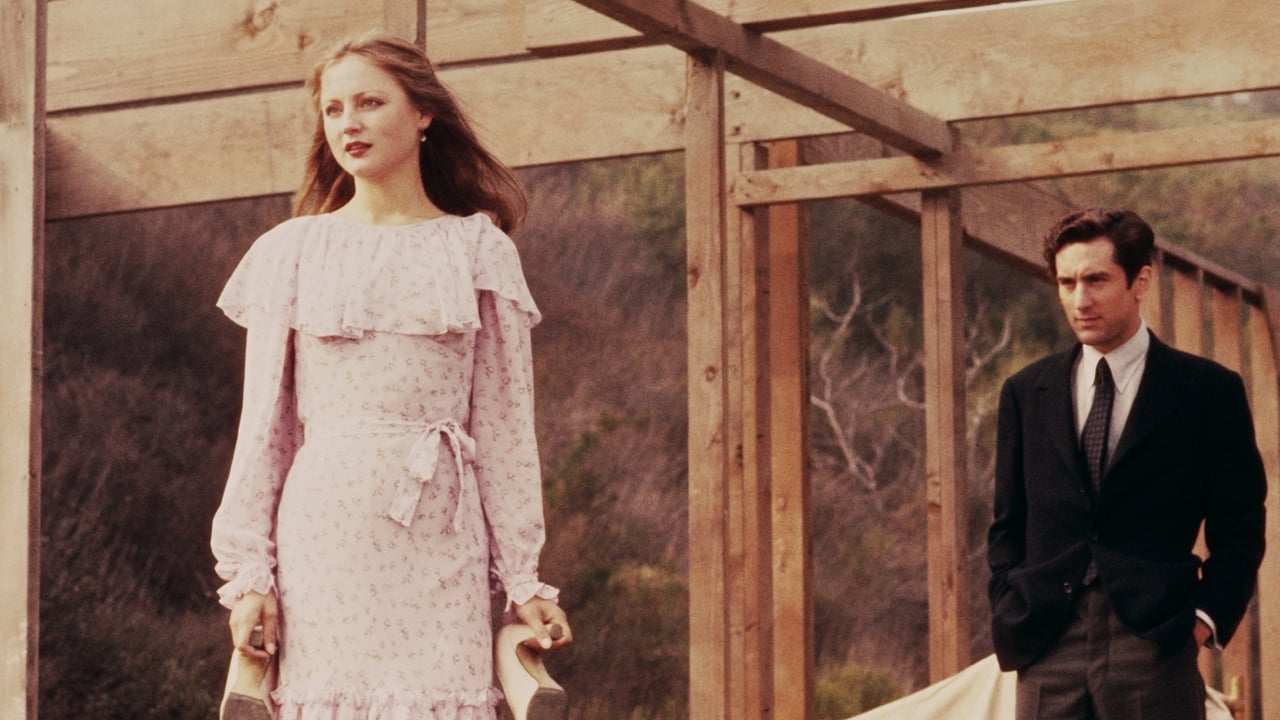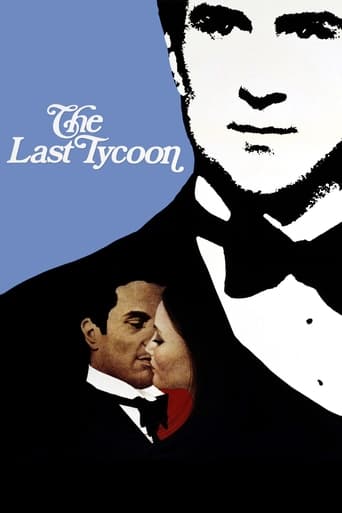



A Disappointing Continuation
A brilliant film that helped define a genre
The movie turns out to be a little better than the average. Starting from a romantic formula often seen in the cinema, it ends in the most predictable (and somewhat bland) way.
View MoreExactly the movie you think it is, but not the movie you want it to be.
View MoreFilm Review: "The Last Tycoon" (1976)The last picture show of Director Elia Kazan (1909-2003), who takes F. Scott Fitzgerald's unfinished novel from 1941, adapted for the screen with help of screenwriter Harold Pinter (1930-2008), puts his signature on slow-burning intense character struggles in the Golden Era of Hollywood of the 1930s scenarios, where film studio executive Monroe Stahr, performed by beats underlining, matured-in-isolation actor Robert De Niro, who runs through the film like a train, taking on every obstacles as well as presented opportunities by encountering several women, choosing arguably the false kind to lose balance entirely, over his calmly received incomplete beach house of bliss; masterfully visualized in straight, uncompromising shots in scenes as Monroe's meeting with Mid-Western Writer Brimmer, portrayed by ultra-relaxed actor Jack Nicholson; in an evening of drinking, dining and ping-pong gaming, before a high-pitched hit strikes into this action-denying, quiet and classic drama-indulging two-hour-film about a life of executive producers, following furthermore actor Robert Mitchum (1917-1997) as wise-looking, yet office-women-intercoursing character of Pat Brady, his daughter Cecilia Brady, given face by 18-year-old actress Theresa Russell, who would have been the choice for a future wife in Monroe Stahr's position in order to come to terms of peacemaking. Nevertheless "The Last Tycoon" produced by the director's long-time-benefactor Sam Spiegel (1901-1985) does miss the universal messages for a wider audience to connect to, as the equally-titles 2016 TV show of 9 episodes, which needed exceeding thrills for the character of Monroe actually wants to get out, breaking free of it all, recalling the more-accomplished entertaining picture by Robert Altman "The Player" (1992, which finds satire beats to fight the here-centered black and white cinematic film-in-film moments between world-famous supporting cast Jeanne Moreau & Tony Curtis that probably can only be fully enjoyed by people, who have made the experience in producing some kind of visual-storytelling project in their lives, where the relentless, unforgiving force becomes evident that chances of happiness within are fleeting moments; suddenly there, gone forever, before the cycle renews itself.© 2017 Felix Alexander Dausend (Cinemajesty Entertainments LLC)
View MoreDear IMDb, Why isn't this film more well known? Yes, Ingrid Boulting did ruin it a little bit. She really wasn't up to the mark. You didn't feel that she was this unattainable woman.But the rest of the cast is first rate. I mean, De Niro, Nicholson and Mitchum in the same film - it is one of the great star casts of the 70s. De Niro gets some great chances to show off his acting skills. And then there is Theresa Russell, Tony Curtis and Donald Pleasance lending support.The film is really understated. Maybe it lacked narrative punctuation - I mean those two to three magnificent scenes which would really elevate the movie to another level. But i still like watching this over and over again. It is so memorable and melancholic. Some of the expressions on Den Niro's face were simply devastating. Best Regards, Pimpin.(9/10)
View MoreF. Scott Fitzgerald's writing is beautiful, very lyrical but his character's words are not to be taken at face value. His description is vivid though he does not use fancy - or too many - words. He has a clear point of view or opinion about the people he writes about. But if his writing appears matter-of-fact, fly-on-the-wall, etc. it is anything but that. In THE LAST TYCOON he wants to tell us about his problems with alcohol and women, the effect of communists unionizing Hollywood writers, and - like always - the unique agonies of the very wealthy class. Like his other fiction, dialog is a minor inconvenience serving to support the overall description of what's happening - better conveyed by mood, atmosphere and pretense. Not in spite of but as a result of FSF's talent, his writing can simply put blunt description in his characters mouth and allow it to melt with his narration. His ability to convey mood is that compelling.Translating such to film creates a problem. The scenes in TLT are comically bad. Irony is given new definition when Stahr rejects a scene on the basis that 'People don't talk that way". People don't talk like the characters in TLT. Allow me to suggest that a successful adaptation of an FSF story would contain limited dialog, even to the extent such requires omitting what dialog the novel or short story contains. Sometimes a literal interpretation is not necessarily faithful.
View MoreFor a little while as I watched the Last Tycoon, I thought I could understand what the critics said of this film when it first came out (the majority of them I mean). The screenplay, written by Harold Pinter from what is supposedly a much richer (albeit incomplete) text from F. Scott Fitzgerald, stages many scenes like how one would see on a theater stage, with only one or two little directional differences with Elia Kazan's take on the material. This, plus its slightly 'dry' style (i.e. very little musical score, limited camera movement, performances kept without much, if at all, improvisation), makes things seem almost too much in the realm of the naturalistic, of drama kept to a minimum of interaction.But as the film went along like this, I started to notice something: the sort of coldness, almost a loneliness, with the character of Monroe Stahr, is what actually makes a lot of the movie work for all its intents and purposes. It has the veneer of being a little distanced, of not having the full driving force of drama and comedy (although it does have both of those in bits and pieces, more as little familial or romantic drama or one-line throwaways) like an 8 1/2 or the Player with dealing in the problems of a professional in the film industry. But because of Stahr's method of practices, of being as Mitchum's character describes "like a priest or a rabbi, 'this is how it will be'", when he's told 'no' it shatters him. As a film about loss, and the very calculated realization that his code in business spills over into the personal, the Last Tycoon does work.Maybe not very well, but work it does, as storytelling and as a character piece. Sure, it might not be De Niro's best, but he does deliver subtle like it's as second nature as breathing (kind of a twist on his other 1976 character, Travis Bickle, whom he played subtle but also crazy, where as here it's subtle and empty), and he's got plenty of backup. There was some critical flack for the actress Ingrid Boutling, playing the nearly obscure object of Monroe's desire-cum-demand, but she too is better than she was given credit for, at least within the range she's allowed to work in (which, granted, isn't as much as one might think, but she's seen not as a fully-fleshed person but as someone with hints of a reality she needs and a fantasy world of movies she doesn't).Then there's Nicholson, showing up in the final reels for a couple of amazing scenes sparring with De Niro, barely ever raising voices for a low-key one-on-one as a movie exec and communist writer organizer. Not to forget Mitchum, in maybe his last good performance, and Theresa Russell in also an underrated turn as a woman grown up way past her years. Did I mention Jeanne Moreau? She's Moreau, that's about it, playing a completely self-absorbed star for all its one dimension is worth. Only Tony Curtis, with his libido problems isn't par for the course, and Donald Pleasance has a shaky (if darkly funny) scene as a scorned writer.Does the Last Tycoon have some problems as feeling like compelling historical drama? Sure. But does it somehow get into the atmosphere of its character in the context of his profession, revealing all that's absent for him every day coming home to his Asian butler? Absolutely. It's a mix and match that will disappoint some, and for those who want to take the chance on a somewhat forgotten 70s film- Kazan's last and Spiegel's final ego-tickler- might be even more impressed than I was. 7.5/10
View More